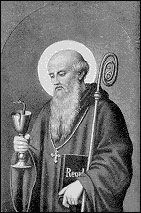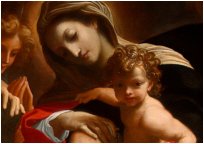
Home
Chapters 1-5
Chapters 6-10
Chapters 11-15
Chapters 16-20
Chapters 21-25
Chapters 26-30
Chapters 31-35
Chapters 36-40
Chapters 41-45
Chapters 46-50
Chapters 51-55
Chapters 56-60
Chapters 61-65
Chapters 66-70
Chapters 71-73
Catholic News
The Holy Mass
Rosary in Latin
Gregory XVII "Siri" The Pope in Red
The Coming Great Catholic Monarch
St. John Bosco's Dream (Vision) of Hell
Examination of Conscience
Antichrist
(Catholic Prophecy)
Catholic Prayer
Infant Baptism in Emergency
Catholic Podcasts
Catholic Links
Contact Information
|
~ Monastic Rule ~
The Holy Rule of St. Benedict

The 1949 Edition
Translated by Rev. Boniface Verheyen, OSB
of St. Benedict's Abbey, Atchison, Kansas
| CHAPTER XI : How the Night Office Is to Be Said on Sundays |
For the night office on Sunday the monks should rise earlier. At this office let the following regulations be observed, namely: after six psalms and the verse have been sung, as we arranged above, and all have been properly seated on the benches in their order, let four lessons with their responsories be read from the book, as we said above. In the fourth responsory only, let the Gloria be said by the chanter, and as soon as he beginneth it let all presently rise with reverence.
After these lessons let six other psalms with antiphons and the verse follow in order as before. After these let there be said three canticles from the Prophets, selected by the Abbot, and chanted with Alleluia. When the verse also hath been said and the Abbot hath given the blessing, let four other lessons from the New Testament be read in the order above mentioned. But after the fourth responsory let the Abbot intone the hymn Te Deum laudamus. When this hath been said, let the Abbot read the lesson from the Gospel, all standing with reverence and awe. When the Gospel hath been read let all answer Amen, and immediately the Abbot will follow up with the hymn Te decet laus, and when he hath given the blessing Lauds will begin.
Let this order of the night office be observed on Sunday the same way in all seasons, in summer as well as in winter, unless perchance (which God forbid) the brethren should rise too late and part of the lessons or the responsories would have to be shortened. Let every precaution be taken that this does not occur. If it should happen, let him through whose neglect it came about make due satisfaction for it to God in the oratory.
| CHAPTER XII : How Lauds Are to Be Said |
At Lauds on Sunday, let the 66th psalm be said first simply, without an antiphon. After that let the 50th psalm be said with Alleluia; after this let the 117th and the 62d be said; then the blessing and the praises, one lesson from the Apocalypse, said by heart, a responsory, the Ambrosian hymn, the verse and the canticle from the Gospel, the litany, and it is finished.
| CHAPTER XIII : How Lauds Are to Be Said on Week Days |
On week days let Lauds be celebrated in the following manner, to wit: Let the 66th psalm be said without an antiphon, drawing it out a little as on Sunday, that all may arriver for the 50th, which is to be said with an antiphon. After this let two other psalms be said according to custom; namely, the 5th and the 35th on the second day, the 42d and the 56th on the third day, the 63rd and the 64th on the fourth day, the 87th and the 89th on the fifth day, the 75th and the 91st on the sixth day, and on Saturday the 142d and the canticle of Deuteronomy, which should be divided into two Glorias. On the other days, however, let the canticle from the Prophets, each for its proper day, be said as the Roman Church singeth it. After these let the psalms of praise follow; then one lesson from the Apostle, to be said from memory, the responsory, the Ambrosian hymn, the verse, the canticle from the Gospel, the litany, and it is finished.
Owing to the sandals which are wont to spring up, the morning and the evening office should, plainly, never end unless the Lord's Prayer is said in the hearing of all by the Superior in its place at the end; so that in virtue of the promise which the brethren make when they say, "Forgive us as we forgive" (Mt 6:12), they may cleanse themselves of failings of this kind.
At the other hours which are to be said, however, let only the last part of this prayer be said aloud, so that all may answer, "But deliver us from evil" (Mt 6:13).
| CHAPTER XIV : How the Night Office Is to Be Said on the Feasts of the Saints |
On the feasts of the saints and on all solemn festivals let the night office be performed as we said it should be done on Sunday; except that the psalms, the antiphons, and the lessons proper for that day be said; but let the number above mentioned be maintained.
| CHAPTER XV : At What Times the Alleluia Is to Be Said |
From holy Easter until Pentecost let the Alleluia be said without intermission, both with the psalms and with the responsories; but from Pentecost until the beginning of Lent let it be said every night at the nocturns with the six latter psalms only. However, on all Sundays outside of Lent, let the canticles, Lauds, Prime, Tierce, Sext, and None be said with Alleluia. Let Vespers, however, be said with the antiphon; but let the responsories never be said with Alleluia, except from Easter to Pentecost.
Continue to the...

© StGemma.com Web Productions Inc. 2005-2011. All rights reserved.
|


